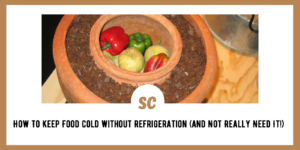When you find yourself without any access to electricity or other power sources, you might worry how to keep your perishable food cold without a working refrigerator. Whether your power is out as a result of a natural disaster, or you’re living off the grid due to a man-made disaster, the truth is that there are ways for you to keep things cool without refrigeration. Think about it – the pioneers were able to do it, and so can you! Keep reading for our tips on how to make do without a cold refrigerator.
SKIP AHEAD
5 Tips On How To Cope Without Refrigeration For Your Food
So, let’s assume that you don’t have access to any solar panels or a generator to run your refrigerator. You have zero power sources. Here’s what you can do in place of refrigeration and how to adapt to live without it.
Re-Think Your Food Storage
If you’re like most people, then you go to the grocery store and buy enough food for a week or more. Then, you get home and add all the cold stuff, as well as fresh produce, to the refrigerator. Then, over the course of the week, you add some leftovers to the fridge and let them sit in their for days.
This line of thinking needs to change when you’re not able to use a refrigerator. Most fruits and vegetables don’t really need to be refrigerated. And unless you’re hunkering down for the long haul, you probably don’t need to do bulk shopping, or gathering, of perishable foods.
Find Cooler Areas Of Your Home
The easiest way to keep things cool is to look for areas of your home that are naturally cooler. For instance, if you have a basement in the home, then it is going to be a lot cooler than the rest of the house. You could also use a well or even look for a cave on your property.
Just remember to put your food in air-tight containers so that critters don’t eat up all your grub!
Re-Think How You Eat
Instead of leaving leftovers to sit for days before you eat them, change your ways and eat the leftovers for your next meal. Keep this up until the leftovers are gone. Since you can’t store your leftover food as safely, it is best if you don’t let it sit around for too long in your basement or other storage.
Also, don’t cook so much food that you end up with a lot of leftovers. The exception to this is if you have some raw meat, because it is better to cook it instead of leaving it raw.
Additionally, consider changing your diet so that you eat more foods that are not perishable or that don’t even need to be cooked before you eat it.
Make Alternative Coolers
If you need something that is even cooler than your basement, then you can make your own alternative cooler to get some lower temperatures. Probably the most common type here that you’ve heard of is an evaporative cooler. However, evaporative cooling works best in areas with low humidity. A Zeer pot is another type of cooler that you can hack together when you have no access to a refrigerator.
Look For Running Water
If you have access to a stream on your property, then it is a great source of refrigeration for your food. But it has to be running water, not stagnant water. And if you’re lucky enough to live where the water comes from snow run-off, then it will be even cooler.
Why does running water is cool enough for refrigeration? As the the water moves, more of it is exposed to air and the evaporation cools down the water. Rough water, like white water rapids, is even cooler since even more of the water gets exposed to air.
So, just put your food container in the running water to keep it cool. Just remember to securely anchor it to the shore and be sure that it is air tight to prevent wildlife from stealing your food.
More resources:
- Off The Grid News, How to build your own off-the-grid refrigerator
- Stack Exchange, Best way to keep food cool indoors without using a fridge/freezer
Pot-in-pot cooler image by James Emery/ FlickrCC2.0 license


